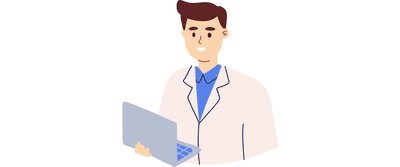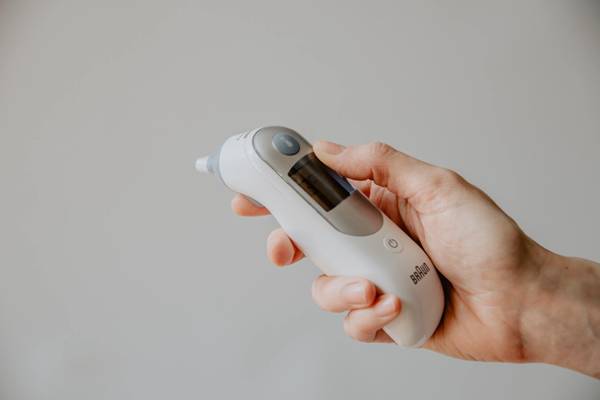![Healthy Matters]() Pharmacist Tips | Dosages | Side effects
Pharmacist Tips | Dosages | Side effects![Healthy Matters]() Nutritionist Tips | Facts | Precautions
Nutritionist Tips | Facts | Precautions![Healthy Matters]() Practitioner Tips | Dosages | Side effects
Practitioner Tips | Dosages | Side effects![Healthy Matters]()
![Healthy Matters]()

Fever: Everything You Need to Know, Doctor-Reviewed
3 min read

You feel that your forehead is hotter than usual; you may also shiver and be tired. Then, you may start to feel irritated at the thought of having a fever. Actually, fevers are a good thing! Learn more about one of your body’s natural defence.
What is a fever?
A fever is a rise in body temperature (38°C or 100.4°F or higher) which is higher than usual (37°C or 98.6°F), albeit everyone may have a different "normal" temperature. Body temperature also changes because of exercise and menstrual cycles, for example. Teething in infants may cause a slight increase in temperature, but it is often not considered a fever.
A fever is usually mild and harmless. It should not last long and your temperature typically goes back to normal within 3-4 days. However, it could also be a sign of a serious health condition. Not all fevers need to be treated.
A fever occurs when the body is fighting an infection or illness. The hypothalamus in the brain controls our body temperature. When there are germs detected, it raises the temperature, making it difficult for them to survive.
To tell if you have a fever, you need to take your temperature using a thermometer, ideally taken from the ear.
It is possible to catch a fever through coughing or sneezing, or breathing in air droplets of secretions from a person who has fever caused by viral or bacterial infections.

What causes a fever?
A number of conditions can lead to a fever, for example:
- Infections caused by virus or bacteria, e.g. urinary tract infections (UTIs), flu, strep throat or chickenpox.
- Heatstroke, heat exhaustion or sunburn.
- Inflammatory diseases, e.g. tonsillitis or rheumatic arthritis.
- Medications: antibiotics (e.g. beta-lactams like cloxacillin and cephalexin), blood pressure drugs (e.g. amlodipine), anti-seizure drugs (e.g. carbamazepine).
- Some childhood immunizations may cause a low-grade fever (100.5-102°F or 38.1-39°C), e.g. influenza vaccines or pneumococcal vaccines.
- Underlying medical issues.
Fever and COVID-19 : When to worry?
Fever is one of the most common symptoms of COVID-19, which also include tiredness and dry cough. Other symptoms to watch out for include shortness of breath, aches, sore throat, diarrhea, nausea and a runny nose.
If you have a fever, get in touch with your GP.
You should consider getting tested if you have been in close contact with a confirmed COVID-19 case.
When to see a doctor?
You should see your GP if you:
- have a fever persisting for more than 3 days.
- show signs of dehydration, e.g. severe thirst, dry lips or dark-yellow urine.
- have a fever after visiting a foreign country.
- are pregnant.
- have been bitten by insects, e.g. mosquitoes.
- have a fever with a skin rash, heightened sensitivity to light, difficulty breathing, severe headache or neck pain, seizure, severe vomiting, diarrhea or severe body pain.
- have worsening symptoms or new symptoms.
- have a weakened immune system, e.g. from long-term steroids or chemotherapy.
- have a chronic disease, e.g. diabetes, asthma or sickle cell disease.
You should also take your child to visit your doctor immediately if they:
- are younger than 12 months.
- 12 months or older and not controlled with fever medicines after 1-2 days.
- fever above 39.
- have a fever and a seizure, a rash or shows signs of dehydration, e.g. diapers that are not very wet.
- are drowsy, confused or not as responsive as usual.
- also have other medical conditions, e.g. heart disease or lupus.
- seem irritable or fussy.
- if you have any concerns as a parent.
How to treat a fever?
It is important to look for the underlying cause of the fever.
A mild fever usually does not require treatment. Treatment also depends on the cause. For example:
- Antibiotics: your doctor may prescribe antibiotics if the fever is caused by a bacterial infection. Antibiotics do not help with viral fevers.
- Medications for fever and pain: e.g. paracetamol, non-steroidal anti-inflammatory drugs like ibuprofen, naproxen and aspirin.
Note that aspirin is not for those under 16 years of age as it is associated with Reye’s syndrome. Also, do not give any medicines to a baby under 3 months by yourself. Always consult your doctor or pharmacist for advice.
- Hospitalization: may be needed in infants aged below 28 days.
What can you do to feel better?
- Make sure that you have enough fluids to prevent dehydration. Avoid drinks containing alcohol and caffeine as it can worsen dehydration.
- Eat foods that are easy to digest, such as congee. But generally, you can still eat what you want.
- Stay comfortable in your clothes, bed or room. Do not underdress to cool yourself or overdress even if you have chills (heat cannot escape and this raises the temperature even higher).
- Take baths or showers with lukewarm water.
- Get plenty of rest. Avoid schools or work until you have recovered.
Prevention
- Practice good personal hygiene, e.g. clean hands with soap and water or alcohol-based hand rubs, and cover your nose and mouth with disposable tissues when coughing or sneezing.
- Avoid touching your nose, mouth or eyes with unwashed hands.
Dr. Lily Wong 黃淑婷醫生 is a family practitioner at The London Medical Clinic. She is both a registered general practitioner and a pharmacist in the UK and HK. Having lived and worked as a general practitioner for many years in busy practices in London, she relocated to Hong Kong with her family a few years ago. Dr. Wong has also been appointed Honorary Assistant Professor in the Department of Family Medicine at Hong Kong University, for her teaching of medical students.
This article was independently written by Healthy Matters. It is informative only and not intended to be a substitute for professional medical advice, diagnosis or treatment. It should not be relied upon for specific medical advice.

Your health resource, made in Hong Kong
Healthy Matters is Hong Kong’s leading health resource. Our mission is to help you make better health decisions and take control of your health.
Our team of experts is committed to producing reliable health content that is accurate, engaging and relevant, to cover your health & wellness journey from prevention to treatment.
Whether you are looking for trusted information on health conditions, wellbeing or looking for the right doctor or service in Hong Kong, we’re here to help!
Your health matters. Begin your health journey with Healthy Matters today!
































